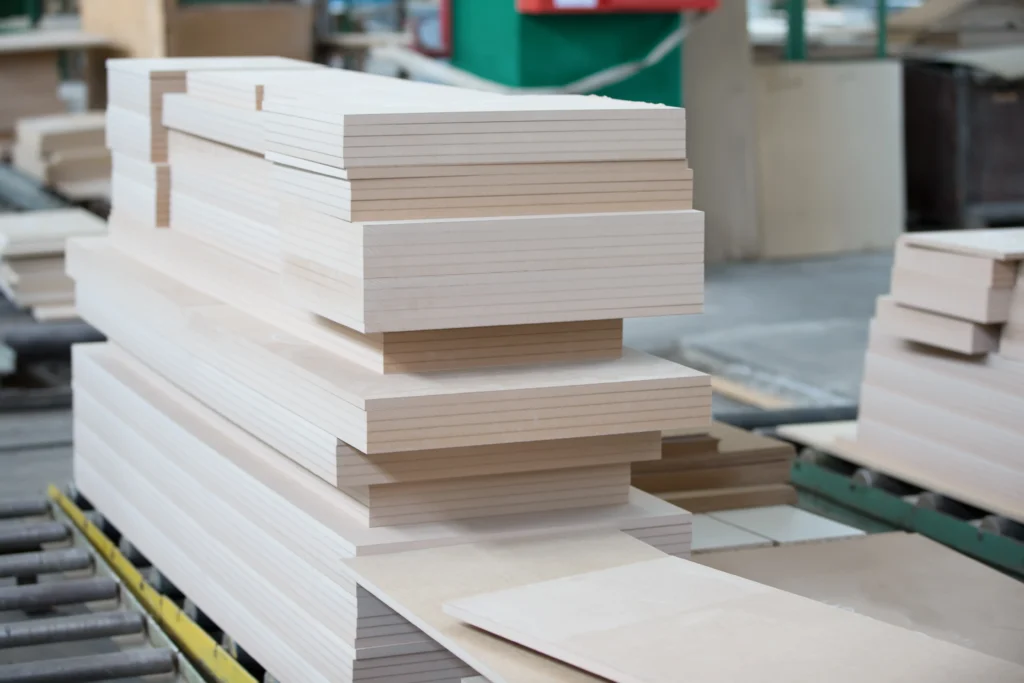What is hardwood plywood?
Hardwood plywood, a versatile engineered wood composite, finds its place in various industries and applications due to its exceptional properties. Crafted from multiple layers of wood bonded together under heat and pressure, hardwood plywood boasts unparalleled strength, durability, and flexibility. Unlike solid wood, it offers uniformity in strength and is less susceptible to warping, making it a preferred choice for a myriad of projects.

Applications of Hardwood Plywood
- Cabinetry and Furniture Making:
Hardwood plywood serves as a primary material in crafting cabinetry and furniture. Its smooth, finished veneers, made from select hardwoods like oak, cherry, or maple, lend a sophisticated look to the final product.
- Musical Instrument Construction:
Renowned for its resonance and stability, hardwood plywood is an integral component in crafting musical instruments such as pianos and stringed instruments. Its structural integrity ensures the longevity and quality of these instruments.
- Building and Construction:
Hardwood plywood finds extensive use in building and construction projects. It serves as an essential material for built-in closets, shelves, doors, panels, flooring, and wall panels. Its versatility allows it to adapt to various architectural designs and applications.
- Outdoor Applications:
With its durability and resistance to weathering, hardwood plywood is an excellent choice for outdoor flooring and paneling. It withstands the elements, making it suitable for decks, patios, and other exterior structures.
- Sports Equipment and Toys:
Hardwood plywood’s strength and flexibility make it an ideal material for crafting sports equipment such as skateboard ramps. Additionally, it is commonly used in toy manufacturing due to its safety and aesthetic appeal.
Advantages of Hardwood Plywood
- Strength and Durability:
Hardwood plywood’s bonded layers and phenolic adhesive contribute to its exceptional strength, surpassing solid wood or steel in some applications. Its durability ensures longevity, making it a cost-effective investment.
- Stability and Resistance:
Unlike solid wood, hardwood plywood is less prone to warping, shrinking, or cracking. Its uniform composition provides stability, making it suitable for high-traffic areas and challenging environments.
- Sustainability:
Hardwood plywood promotes sustainable practices in the woodworking industry. By utilizing more logs efficiently in its manufacturing process, it minimizes waste and maximizes resource utilization.
- Versatility and Flexibility:
Its inherent flexibility enables hardwood plywood to be molded into curved shapes, making it suitable for intricate designs in furniture, cabinets, and architectural elements. Marine-grade plywood, known for its water resistance, finds applications in shipbuilding and marine structures.
- Cost-Effectiveness:
Offering the beauty and strength of solid wood at a fraction of the cost, hardwood plywood is an economical choice for contractors, architects, designers, and DIY enthusiasts alike.
Limitations and Considerations
While hardwood plywood boasts numerous advantages, it’s essential to acknowledge its limitations and considerations. Despite its strength, it may not be suitable for all applications, particularly those requiring extreme load-bearing capacities. Additionally, its thickness and composition may necessitate special construction techniques, adding complexity to certain projects.
In conclusion, hardwood plywood stands as a testament to innovation and efficiency in the woodworking industry. Its versatility, durability, and affordability make it a preferred choice for an array of applications, from furniture making to construction projects. By harnessing the benefits of hardwood plywood, craftsmen and builders can achieve superior results that endure the test of time.
